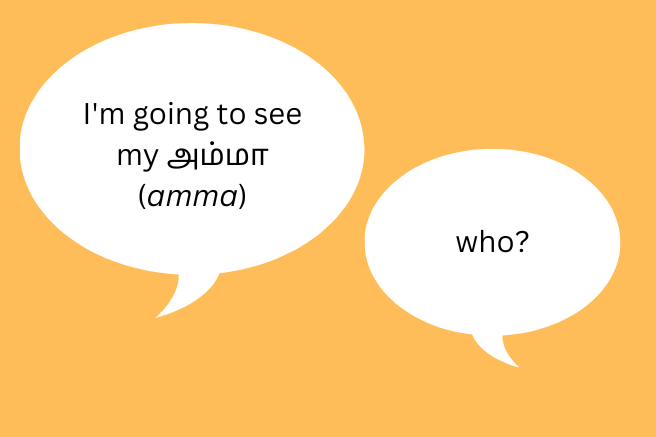
Date on your own terms! myTamilDate.com has been the most trusted dating community for single Tamils around the world for close to a decade! We’re the premiere dating site for diaspora Tamils and have the largest membership base in Canada, USA, UK & more. Join today.
The world is no stranger to cultural assimilation.
During colonial times, many were forced or incentivized into adopting the language, customs and culture of the colonizer.
And considering many countries faced colonization for centuries, one can understand why we still see the effects of assimilation in those very countries today.
But how many people are aware of this, and actively try to reclaim their language or culture?
I have thought deeply about how my community may be unaware of the role assimilation has played when it comes to the Tamil we speak today.
Here is just one example:
Family is a big part of Tamil heritage. The foundation of our heritage is to treat everyone from people to nature as part of your community.
We have specific terms for each and every family member.
These terms help others and ourselves better understand our relationship with one another.
Over time depending on the region or community, these terms have been altered or modernized.
Here is where I believe we may fall into a trap.
To alter terms based on the evolution of a language is one thing. But to excuse many of the effects of assimilation that we must unlearn as modernization is another thing.
Looking at the topic of family relationships, at what point do we “modernize” the Tamil terms we have for our family members so much so, that we are no longer even speaking Tamil?
In my community, your Mother’s younger sister or Father’s younger brother’s wife, should be addressed as your சின்னம்மா (Sinamma)
This word சின்னம்மா (Sinamma), although still in use today, evolved to சித்தி (Sithi). And now, over the past few generations the term சித்தி (Sithi), changed to Aunty.
And no I’m not referring to calling a stranger or your mom’s friend, Aunty.
I mean saying சித்தப்பா (Sithappa) and Aunty. Instead of சித்தி (Sithi) or சின்னம்மா (Sinamma).
Growing up I was confused hearing this from family members who barely spoke English.
I thought Aunty (pronounced “An-ti”) could even have been a Tamil word.
I later realized, the only reason this term is a part of my community’s vocabulary is because a group of people spent hundreds of years forcing their language and culture upon us.
Of course, there is nothing wrong with learning other languages.
But replacing Tamil words with English words does seem alarming.
Replacing the term சின்னம்மா (Sinamma) or சித்தி (Sithi) with the word Aunty loses the understanding of who a சித்தி (Sithi) is and where they would fit into the family structure.
If this continues with other terms as well, who’s to say we won’t lose the entire Tamil family relationship structure?
You may know exactly who Aunty is referring to in this context, but will your grandchildren or great-grandchildren know?
Will they not think Aunty is a general term for Aunt?
One of the ways I’ve chosen to combat this is by learning and sharing.
If you would like an Easy Guide to Tamil Family Relationships, please watch the video linked below.
And hopefully we can collectively become aware of the things we must work on unlearning together!
Listen to our new podcast 'Identity'!
Shakthi / Theatre, Intergenerational Trauma and Australian Tamil Identity


























